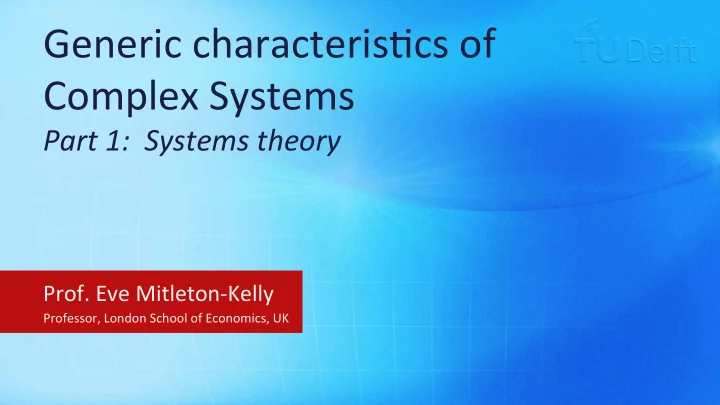

Generic ¡characteris=cs ¡of ¡ Complex ¡Systems ¡ Part ¡1: ¡ ¡Systems ¡theory ¡ ¡ Prof. ¡Eve ¡Mitleton-‑Kelly ¡ Professor, ¡London ¡School ¡of ¡Economics, ¡UK ¡
Generic ¡characteris=cs ¡ ¡ of ¡complex ¡co-‑evolving ¡systems ¡ ¡ Part ¡1 ¡– ¡Systems ¡Theory ¡ connec2vity ¡ ¡ § inter-‑dependence ¡ § feedback ¡ ¡ § emergence ¡ § Part ¡2 ¡– ¡Complexity ¡Theory ¡ self-‑organisa2on ¡ § space ¡of ¡possibili2es ¡ § co-‑evolu2on ¡ § historicity ¡& ¡2me ¡ § far ¡from ¡equilibrium ¡ § crea2on ¡of ¡new ¡order ¡
Complex ¡Behaviour ¡ § Arises ¡from ¡ Interac(on ¡ § Focuses ¡on ¡ Rela(onships ¡ ¡ Complex ¡systems ¡can ¡ create ¡new ¡order ¡ ¡
Connec=vity ¡& ¡interdependence ¡ Networks ¡of ¡rela=onships ¡with ¡ Degrees ¡of ¡connec2vity ¡ § Strength ¡of ¡coupling ¡ § Epista8c ¡Interac8ons ¡ i.e. ¡the ¡fitness ¡contribu=on ¡made ¡ by ¡one ¡individual ¡will ¡depend ¡ upon ¡related ¡individuals ¡
Connec=vity ¡& ¡interdependence ¡ Intense ¡interconnec=vity ¡creates ¡ § mul2ple ¡ and ¡intricate ¡ dependencies ¡ cannot ¡be ¡pulled ¡apart ¡ § Outcomes ¡are ¡oNen ¡ non-‑ § determinis2c ¡ Complexity ¡does ¡not ¡argue ¡for ¡ § ever ¡increasing ¡connec=vity ¡ § May ¡lead ¡to ¡ complexity ¡ catastrophe ¡
500 ¡corpora=ons ¡with ¡the ¡ highest ¡stock-‑trading ¡ volume ¡were ¡analysed ¡ ¡ ¡ Map ¡of ¡links ¡between ¡ companies ¡in ¡5 ¡key ¡ economic ¡sectors: ¡ technology ¡(blue), ¡ ¡ § oil ¡(dark ¡grey), ¡ ¡ § other ¡basic ¡materials ¡(light ¡ § grey), ¡ ¡ finance ¡linked ¡to ¡real ¡estate ¡ § (dark ¡green) ¡ other ¡finance ¡(light ¡green). ¡ ¡ § ¡ “Networks ¡of ¡Economic ¡Market ¡Interdependence ¡and ¡Systemic ¡Risk” ¡ D. ¡Harmon, ¡B. ¡Stacey, ¡Y. ¡Bar-‑Yam, ¡2010 ¡
As ¡the ¡sectors ¡came ¡ together, ¡changes ¡in ¡ one ¡affected ¡the ¡others ¡ ¡– ¡ ¡WHY? ¡
Feedback ¡ • Posi(ve ¡feedback ¡tends ¡to ¡ cause ¡system ¡ instability ¡ • Nega(ve ¡feedback ¡tends ¡to ¡ cause ¡system ¡ stability ¡
Posi8ve ¡Feedback ¡ Herdwick ¡Stampede ¡(or ¡human ¡investors?) ¡
Feedback ¡ Posi(ve ¡feedback ¡tends ¡to ¡cause ¡ system ¡instability ¡ NUMBER ¡OF ¡ Posi=ve ¡feedback ¡can ¡quickly ¡lead ¡to ¡ § CATTLE ¡RUNNING ¡ A ¡bank ¡run ¡or ¡even ¡ ¡ § the ¡global ¡financial ¡crisis ¡ Loss ¡in ¡confidence ¡ § ¡ e.g. ¡alarm ¡or ¡panic ¡can ¡spread ¡by ¡ § posi=ve ¡feedback ¡among ¡investors ¡as ¡it ¡ OVERALL ¡LEVEL ¡ OF ¡PANIC ¡ does ¡among ¡a ¡herd ¡of ¡animals ¡
Feedback ¡ Nega(ve ¡feedback ¡tends ¡to ¡ make ¡a ¡system ¡self-‑regula=ng ¡ It ¡can ¡produce ¡ stability ¡and ¡ § reduce ¡the ¡effect ¡of ¡fluctua=ons ¡ ¡ e.g. ¡the ¡ballcock ¡of ¡float ¡valve ¡ § uses ¡nega=ve ¡feedback ¡to ¡ control ¡the ¡water ¡level ¡in ¡a ¡ cistern ¡
Feedback ¡
Feedback ¡ Nega=ve ¡feedback ¡has ¡a ¡stabilising ¡effect, ¡ and ¡implies ¡a ¡single ¡equilibrium ¡point. ¡ ¡ ¡ Based ¡on ¡the ¡assump=on ¡that ¡the ¡ right ¡ amount ¡of ¡correc8on ¡ can ¡be ¡applied ¡in ¡the ¡ most ¡8mely ¡manner . ¡ ¡ Both ¡posi=ve ¡and ¡nega=ve ¡feedback ¡could ¡ exist ¡at ¡the ¡same ¡=me ¡or ¡they ¡may ¡follow ¡ each ¡other ¡leading ¡to ¡mul=ple ¡equilibria. ¡
Emergence ¡ BoFom-‑up ¡(micro ¡to ¡macro): ¡ § through ¡interac=on ¡of ¡individual ¡ interac=ng ¡agents ¡ ¡ Two-‑way ¡process! ¡ Top ¡down ¡(macro ¡to ¡micro): ¡the ¡ § emergent ¡affects ¡the ¡interac=ng ¡ agents ¡in ¡two ¡ways: ¡ a) It ¡constrains ¡some ¡ac=ons; ¡ b) At ¡the ¡same ¡=me ¡it ¡opens ¡up ¡new ¡ possibili=es. ¡
Emergence ¡ Emergent ¡processes, ¡quali=es, ¡ § pa^erns ¡ Arise ¡from ¡ interac(on ¡ § Cannot ¡always ¡be ¡predicted ¡ § Not ¡addi=ve ¡or ¡cumula=ve ¡ § More ¡than ¡the ¡sum ¡of ¡the ¡parts ¡ § Process ¡of ¡transi(on ¡ from ¡micro-‑ § agent ¡interac=on ¡to ¡macro-‑ structures ¡ e.g. ¡learning, ¡culture, ¡innova8on ¡ § new ¡ways ¡of ¡organising/new ¡ § organisa=onal ¡forms ¡ ¡
Generic ¡characteris=cs ¡ ¡ of ¡complex ¡co-‑evolving ¡systems ¡ ¡ Part ¡1 ¡– ¡Systems ¡Theory ¡ connec2vity ¡ ¡ § inter-‑dependence ¡ § feedback ¡ ¡ § emergence ¡ § Part ¡2 ¡– ¡Complexity ¡Theory ¡ self-‑organisa2on ¡ § space ¡of ¡possibili2es ¡ § co-‑evolu2on ¡ § historicity ¡& ¡2me ¡ § far ¡from ¡equilibrium ¡ § crea2on ¡of ¡new ¡order ¡
Thank ¡you ¡for ¡your ¡a[en2on! ¡ Please ¡post ¡any ¡ques2ons ¡you ¡may ¡have ¡on ¡our ¡ discussion ¡forum ¡
Recommend
More recommend